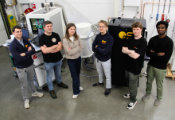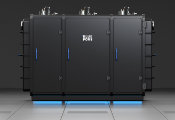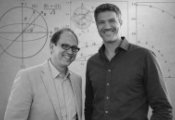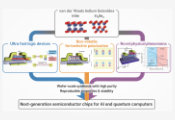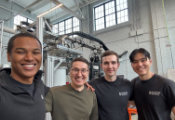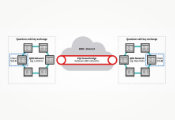Building the Quantum Workforce of the Future: A New Study Seeks the Way
September 30, 2025 -- A team of physicists and education researchers is spearheading the largest study of its kind exploring how the United States can meet the needs of the rapidly growing quantum technology industry.
The study, which launched in 2024, is led by CU Boulder and Rochester Institute of Technology and funded by the U.S. National Science Foundation and the Laboratory for Physical Science Qubit Collaboratory.
In recent years, quantum technology companies have begun to pop up across the United States. These companies design technologies that tap into some of the unique properties of very small things like atoms and electrons. Such technologies include “quantum computers” that could one day discover previously unknown medications, or sensors that can detect signs of illness in a single puff of breath.
But the growth of the industry also raises a major question, said physicist Heather Lewandowski, one of the project leads: How can the nation better prepare students to enter this uncharted industry?
“Quantum is big, both in Colorado and throughout the nation,” said Lewandowski, a fellow of JILA, a joint research institute between CU Boulder at the National Institute of Standards and Technology (NIST). “Universities are starting new courses, new degrees, new minors, and they need data. They need to understand the types of knowledge, skills and abilities students need to be successful in the quantum workforce.”
The project is particularly timely. In 2023, the U.S. Economic Development Administration (EDA) named Elevate Quantum—a coalition of 120 organizations in the Mountain West, with CU Boulder as a prime contributor—an official tech hub for quantum information technology. Today, the industry employs 3,000 people in Colorado alone. That number could rise to 10,000 in the next decade, according to some estimates.
To help prepare today’s students for that new frontier, Lewandowski and her colleagues set out on a massive undertaking.
In their study, the researchers are surveying the course offerings at more than 1,400 degree-granting institutions in the United States. They will also interview 200 professionals from quantum companies in Colorado and beyond.
The group has captured some of its preliminary results in a series of studies published online ahead of print.
“Questions about workforce development and education planning are complicated because how do you plan for what’s going to happen in this industry in five years?” said Shams El-Adawy, a postdoctoral research associate on Lewandowski’s team.
Study time
Lewandowski noted that quantum technologies are nothing new. Many everyday tools, such as the laser scanners at grocery stores or the transistors in your computer, rely on an understanding of the physics of very small things.
The recent growth in quantum companies, however, stems from technologies that take advantage of two quantum properties—entanglement and superposition. They are phenomena that allow scientists to, for example, measure things they couldn’t with traditional technology. The field is sometimes known as quantum information science.
“Whether it's measuring magnetic fields in the brain or the pull of gravity, the better you can measure things, the better you can understand the physical world,” Lewandowski said.
In the current study, Lewandowski, El-Adawy and their colleagues set out to understand how universities around the country are responding to this uncharted industry.
They built an interactive map of every quantum information science program in the nation—including the degrees, minors, concentrations and more offered by institutions of higher learning.
Colorado, for example, is home to six institutions that offer courses in quantum information science. CU Boulder alone offers 13 courses in the field.
Many of these courses are still only available to graduate students, but the offerings for undergrads are growing, El-Adawy said. Many schools are also getting creative about how they give students a grounding in quantum technologies.
“A lot of disciplines are sprinkling some of these topics in quantum information science into courses that are not fully dedicated to quantum information science, such as existing quantum courses,” she said.
Get to work
So far, the researchers have talked to more than 40 representatives from quantum technology companies, both in Colorado and around the United States. They urge interested business leaders, scientists, engineers and more to reach out if they want to participate.
In a study published online ahead of print, a clear trend jumped out at the researchers from the interviews: Businesses really want to hire recent graduates who have hands-on experience with quantum technologies. That might include everything from writing the complex algorithms that govern quantum computers to working with specialized lasers in an engineering lab class.
In 2023, CU Boulder launched the Quantum Scholars Program. It connects undergraduate students at the university to quantum companies in the area, showing them what kinds of careers are possible in the field.
“Our goal is to come back to the higher ed community and say, ‘What do we do with this knowledge?” Lewandowski said. “How do we build it into learning goals for classes and programs?”


